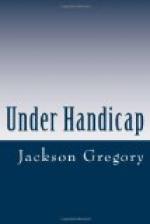Conniston was sorry to be separated from Lonesome Pete, the only man of the outfit with whom he spoke a dozen words a day, the only man who did not treat him as a rank outsider and an alien. But, on the other hand, he was glad that he was to be given a respite from the blistering wires of the cross-fence, that he was to be given change of work. And when he learned what the work was he was doubly glad. The three men were to ride twenty miles from the bunk-house to the lower corrals of the Lone Dog to gather up a herd of steers there and drive them across to the Sunk Hole. It would mean long hours in the saddle, but Conniston told himself that riding, urging on lagging cattle, would be almost rest after the drudgery of the last four days. And in some elusive way, not clear to himself, he felt that this work carried with it a bit less humiliation than the sort of “hired man’s work” which he had been doing with Lonesome Pete.
Like many men who know of the range only what they have read in books, only what they have seen in breezy pictures, it seemed to Conniston that there could be no life so lazy as that of the cowboy who has nothing to do but ride a spirited horse, day in and day out to drive sluggish-blooded cows from one pasture to another or to a market-place, to watch over them as they grazed, or to ride along the outskirts of a scattering herd to see that they did not stray beyond a set boundary-line. That life, as he saw it, was an existence without responsibility, without fatigue, even tinged with something of exhilaration as one galloped up and down over wide grassy meadows. To-day he began to learn that a gay-colored picture may hide quite as much as it shows.
They left the Half Moon corrals at a gentle canter, Conniston swinging along beside the other men, actually enjoying himself. He wondered at the deliberate slowness with which Rawhide Jones and Toothy began their errand. For he had heard the few short orders which Brayley had given, and he knew that to-day was a day of haste, with much to be done. But before they had cantered more than a mile across the rolling country to the west he saw that there was going to be no loitering. They had ridden slowly only until their horses had “warmed up,” and now, shaking out their reins loosely, they swept on at a pace which allowed of little conversation. They drew away from the Half Moon corrals at four o’clock. It was not yet six when they pulled in their panting, sweat-covered horses at the corrals of the Lone Dog.
These corrals were at the lower, eastern end of the Lone Dog, and some ten miles from the Lone Dog bunk-house. To reach them the three men had ridden across three spurs of the mountains, across much rough country, and always at a swinging gallop. Conniston’s legs, where they rubbed against the sweat leathers of his saddle, were already chafed and raw. With the day’s work still ahead of him he was tired and sore. He was more glad than he was willing to confess even to himself when he saw the corrals ahead. For now, he assured himself, there could be little to do but jog along after a slow-moving body of cattle.




